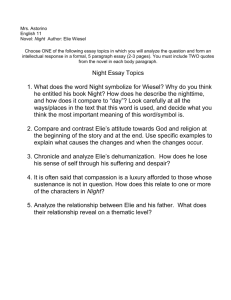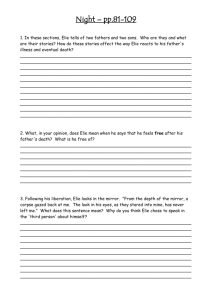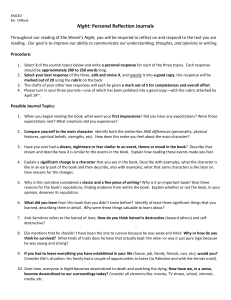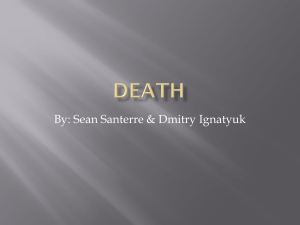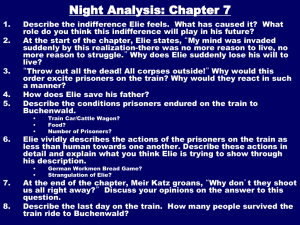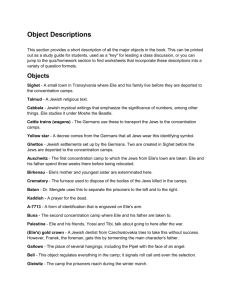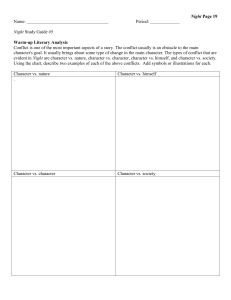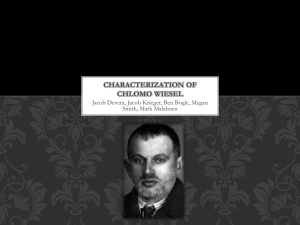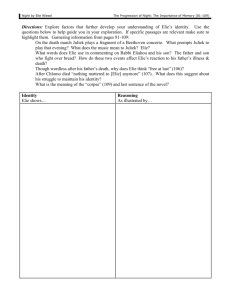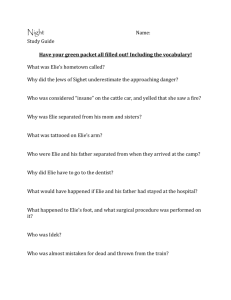Night By Elie Wiesel Night is the account of a young man (Elie) who
advertisement
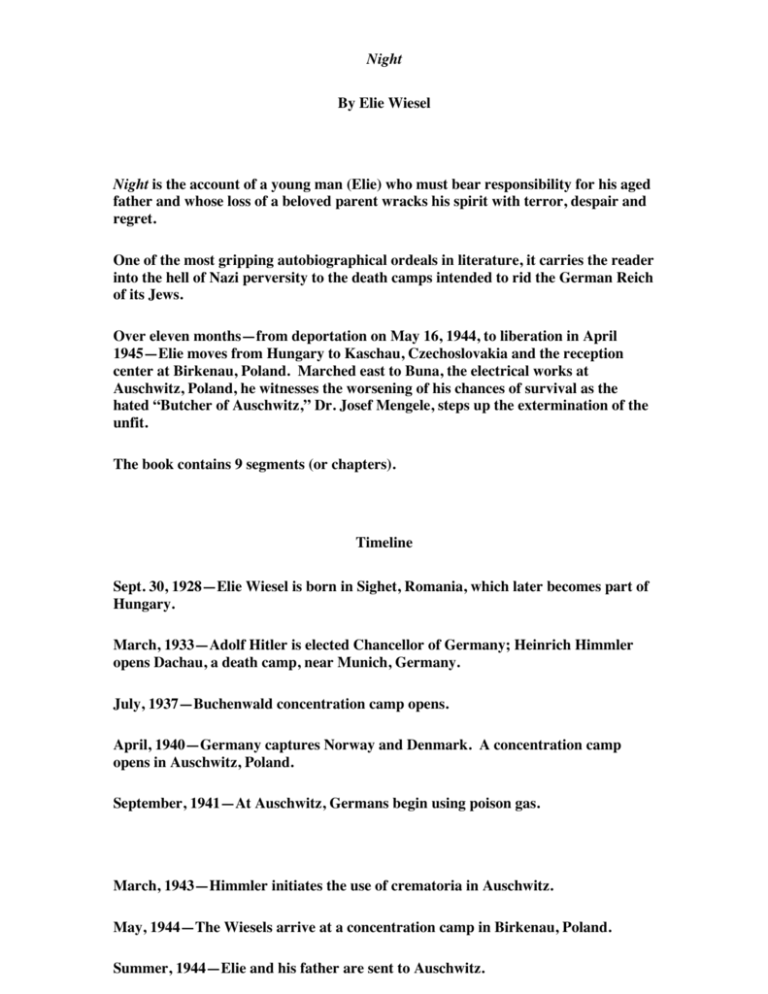
Night By Elie Wiesel Night is the account of a young man (Elie) who must bear responsibility for his aged father and whose loss of a beloved parent wracks his spirit with terror, despair and regret. One of the most gripping autobiographical ordeals in literature, it carries the reader into the hell of Nazi perversity to the death camps intended to rid the German Reich of its Jews. Over eleven months—from deportation on May 16, 1944, to liberation in April 1945—Elie moves from Hungary to Kaschau, Czechoslovakia and the reception center at Birkenau, Poland. Marched east to Buna, the electrical works at Auschwitz, Poland, he witnesses the worsening of his chances of survival as the hated “Butcher of Auschwitz,” Dr. Josef Mengele, steps up the extermination of the unfit. The book contains 9 segments (or chapters). Timeline Sept. 30, 1928—Elie Wiesel is born in Sighet, Romania, which later becomes part of Hungary. March, 1933—Adolf Hitler is elected Chancellor of Germany; Heinrich Himmler opens Dachau, a death camp, near Munich, Germany. July, 1937—Buchenwald concentration camp opens. April, 1940—Germany captures Norway and Denmark. A concentration camp opens in Auschwitz, Poland. September, 1941—At Auschwitz, Germans begin using poison gas. March, 1943—Himmler initiates the use of crematoria in Auschwitz. May, 1944—The Wiesels arrive at a concentration camp in Birkenau, Poland. Summer, 1944—Elie and his father are sent to Auschwitz. January, 1945—Elie and his father are taken to Buchenwald, Germany. January 18, 1945—Russian forces liberate Auschwitz April, 1945—American troops free inmates at Dachau and Buchenwald camps. 1947—Elie enters the Sorbonne to study philosophy. 1955—Elie is encouraged to write about his incarceration in a death camp. 1956—Elie enters the U.S. 1960—Elie publishes the English version of Night. 1986—Elie receives the Nobel Peace Prize. Definitions Torah—The primary source in the Jewish religion is the Hebrew Bible, consisting of 24 books divided up into 3 sections. The Torah includes the first five books of the Bible. Talmud—Next in importance to the Hebrew Bible is the Babylonian Talmud, a collections of teachings of early rabbis from the 5th and 6th centuries. Cabbala—a collection of traditional lore that probes the mysteries of the universe. Covers such subjects as angels, death, numerology, and human reasoning. Rosh Hashanah—Marks the new year of the Jewish calendar. It is both a joyous and a solemn holiday. Jews around the world do not work or attend school on this day. Yom Kippur—This is the holiest day of the Jewish calendar. This is considered to be the day in which every individual is judged by God, and thus is a solemn day marked by prayer and repentance. No Jew attends work or school on this day. Passover—And 8-day festival commemorating the freeing of the Israelites from Egyptian bondage. A ritual feast on the first 2 nights of this holiday, called a Seder, includes the recounting of the Passover story. Ritual foods are eaten during these eight days which are not eaten at other times of the years. Observant Jews do not work or go to school on the first 2 days and the last 2 days of this holiday. Diaspora—Countries outside of Israel inhabited by Jews. Assimilation—To accept the culture of another group while giving up one’s own. Ghetto—A section of a city in which Jews were required to live surrounded by walls. Genocide—Coined after WWII as a direct result of how some nationalities and ethnic groups, particularly the Jews, were mistreated during the war. Its intention is the total annihilation of a race or ethnic group. Holocaust—refers to the destruction of 6 million Jews (and 6 million non-Jews) during 1933-1945. Its Greek root means “burnt whole.” Aryan Race—The pure Germanic race, used by the Nazis to suggest a superior, non-Jewish Caucasian typified by height, blonde hair, blue eyes. Third Reich—The Third Republic of Germany which began with Hitler’s rule in 1933 and ended with his defeat in 1945. SS— “Schutz-Staffel”—established in 1929 as Hitler’s black-shirted bodyguards. They became the elite guards of the Nazis trained in brutality and put in charge of the concentration camps. Gestapo—the secret police organized in 1933 to uncover and undermine political opposition The Final Solution—the plan devised in 1941 to speed up the system of killing the Jews and “undesirables.” This final method used an efficient system of gas chambers and crematories to kills the Jews. Selection—A term used when the SS forced prisoners to line up for inspection and decided which prisoners would live and which would be killed. People Elie Weisel—the narrator and author of the novel, Night. Chlomo Wiesel—Elie’s father. They manage to stay together during they deportment. Idek—a crazy Kapo who beats Elie. The worst of Elie’s mistreatment comes after he laughs at Idek lying with a young Polish girls. For this, Elie is given 25 lashes and faints. Rabbi Eliahous—this rabbis’ son deserts him in order to survive. Disturbed by the son’s selfishness, Eli prays that he will never grow so callous toward his own father. Heinrich Himmler—Hitler’s second in command and the head of the S.S. He established Dachau, the first Nazi concentration camp, near Munich, Germany. Adolf Hitler—Dictator of Germany; a demagogue and tyrant who obtains power by appealing to the emotions and prejudices of the masses. Dr. Mengele—the “Angel of Death”; a doctor who performed brutal, unnecessary experiments and operations upon prisoners. Places Sighet, Hungary—Elie’s home town Kaschau, Czechoslovakia—The first concentration camp that Elie and his father arrive at after their deportation from Sighet. It is here that they see their wife, mother, sisters and daughters for the last time. Auschwitz, Poland—home of a concentration camp opened in April, 1940. Birkenau, Poland—The Wiesels arrive in this concentration camp in May of 1944. Buchenwald, Germany—home of a concentration opened in July, 1937. Elie and his father are taken here in Jan., 1945
